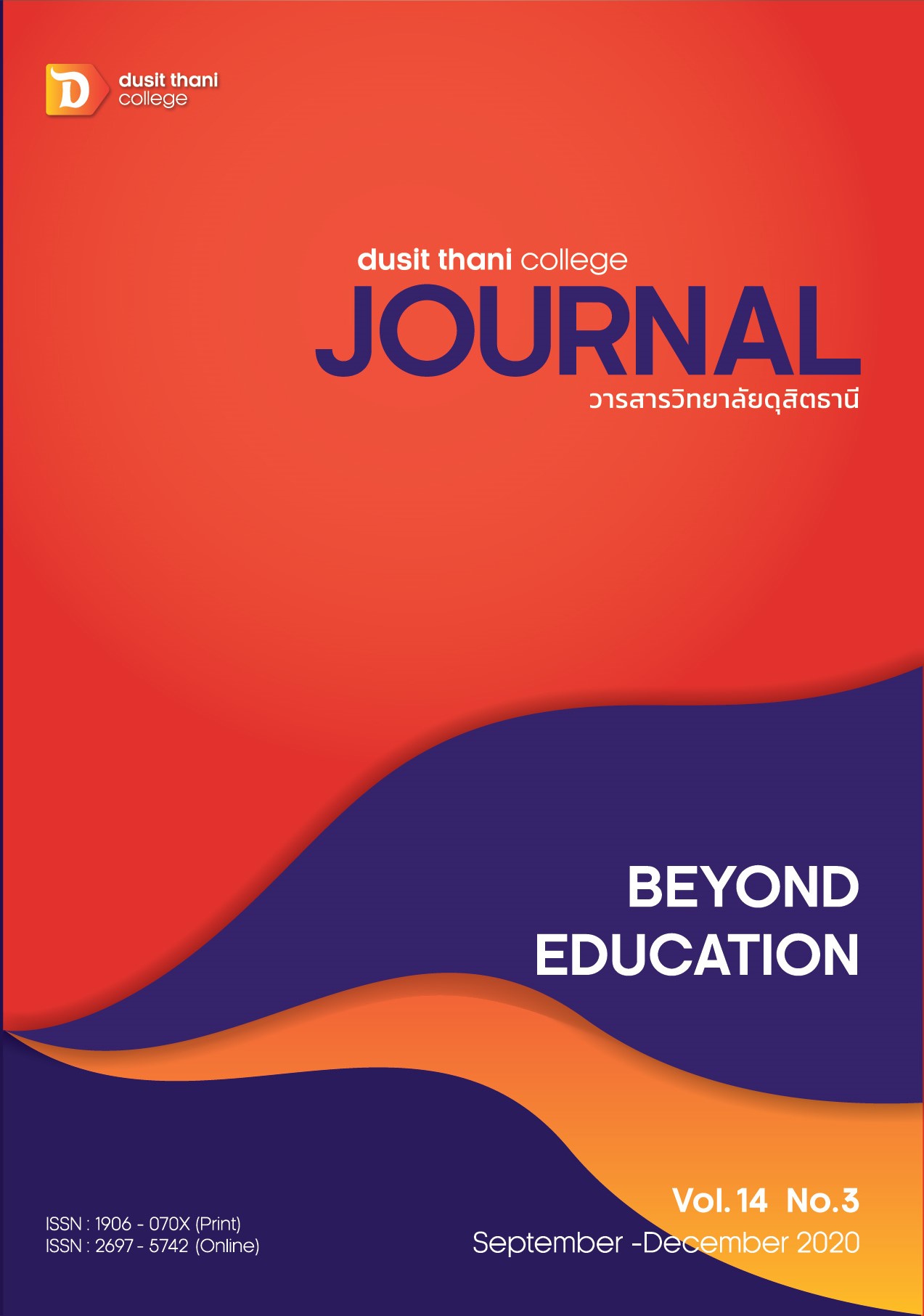A Study of Quality of Life of Supplementary Vocational Trained Farmers
Main Article Content
Abstract
This research had main objectives to study level of quality of life both before and after supplementary vocational training at Research and professional development station for farmers, Phaniat Sub-district, Khoksamrong District, Lopburi Province. Research instrument used was a questionnaire to measure 4 aspects of farmers’ quality of life level including economy, mental, health and social and environment aspects by observing related farmers’ opinion level which categorized into 5-scale rating. Research type was quantitative method that data were collected, 2 times including before and after 6 months of the training, by using questionnaire for 90 farmers participated in supplementary vocational training course. Data analysis was done by employing a statistical analysis computer program in order to derived at various statistics including frequency, percentage, mean and standard deviation. Research results revealed that most farmers were female (69.3 %) with age between 46-66 years (64.4 %) at the minimum of 25 year and maximum of 62 year and the average was 50 year. Most of them were married (55.6 %), having Prathomsuksa education level (55.4 %) and their main occupation was in agriculture.
Comparing farmers’ quality of life level between before and after the training, when the training was completed, it was found that farmers had higher level of quality of life in all aspect including highest level of quality of life on mental aspect (µ= 4.47) and social and environment aspects, higher level of quality of life on economy (µ = 3.92) and health aspect (µ= 3.67) respectively.
Article Details
Article Screening Policy
- All research and academic articles to be published must be considered and screened by three peer reviews in the relevant field / article.
- All articles, texts, illustrations and tables published in the journal are the personal opinions of the authors. Editors don't always have to agree. And no responsibility whatsoever is the sole responsibility of the author.
- The articles to be published must never be published. Where did you first publish? And not in the consideration of other journals If the audit found that there has been a duplicate publication It is the sole responsibility of the author.
- Any article that the reader sees as being plagiarized or impersonated without reference. Or mislead the work of the author Please let the journal editor know it will be your greatest blessing.
References
Future Research. Personal Psychology. 41, 63-105.
Beach, D. S. (1980). Personnel: The Management of People At Work. 4thed.
New York : Macmillan.
Chantharapat, S. (1980). Principle and Career Training Methods. Training Document of Work Management Course, Extension and Community Development. Extension and
Training Office, Kasetsart University. (in Thai)
Davies, B. (2005). The Essentials of School Leadership. London : Paul Chapman.
Flanagan, J. C. (1978). A Research Approach to Improving Our Quality of Life.
American Psychologist. 33(2), 138-147.
Gregoire, T. K., Propp, J. and Poertner, J. (1998). The Supervisor’s Role in The Transfer of
Training. Administration in Social Work. 22(1), 18.
Hopson, B. and Hayes, J. (1968). The Theory & Practice of Vocational Guidance.
Kanjanaprasert, N. and et. al. (1987). Research Report of Study Behaviors on
Population Passed Mind Development in the Ideal of Dhrama Land and
Golden Land, NakhonSawan Province Area :NakhonSawanTeacher College. NakhonSawan. (in Thai)
Knowles, L. (1970). Effective Classroom Management. Journal of Elementary School.
8(2), 219-231.
Kraisith, P. (1998). Education for Human Resources Development. Bangkok :
Faculty of Education, Muban Chombueng RajabhatInstitute. (in Thai)
Liu, B. C. (1975). Quality of Life: Concept, Measure and Results. The American Journal of
Economics and Sociology. 34(1), 1-13.
Makapol, J. (2018). The Study of Approaches to Promote Work for Happiness of the
Older People in ASEAN. Veridian E-Journal, Silpakorn University (Humanities,
Social Sciences and Arts). 11(1), 1467-11486. (in Thai)
Ministry of Agriculture and Cooperative. (2016).Agriculture and Cooperative’s 20 Years
Strategies (2017-2036). Bangkok : Ministry of Agriculture and Cooperative.(in Thai)
Noe, M. (1986). Leadership : System Thinkers in Action. London : Sage.
Paibulsiri, P. (2012). Curriculum Development for Increasing the Quality of Life in the
Aging. EAU Heritage Journal Social Science and Humanities. 2(1), 191-199. (in Thai)
Pruksaudomchai, S. and Thamma-Apipon, S. (2017). Success Factors of Don Faeg Elderly
Club, NakhonPathom Province. Veridian E-Journal, Silpakorn University
(Humanities, Social Sciences and Arts). 10(1), 1439-1453. (in Thai)
Sangchan, T. and Jadesadalug, V. 2012. Life Quality Influences Towards Working
Efficiency Through Relationship with the Organization of the Personnel of
Insurance Company. Veridian E-Journal, Silpakorn University (Humanities and
Social Sciences).6(3), 395-412. (in Thai)
Seyler, D. L., Holton, E. F., Bates, R. A., Burnett, M. F. and Carvalho, M. A. 1998.
Factors Affecting Motivation to Transfer Training. International Journal of
Training and Development 2 (1), 2-16.
Sinlapadech, N. (1997). Population and Quality of Life Development. Bangkok :
Phisit Printing. (in Thai)
Thaneerat, J. (1989). Training Project for the Development of Quality of Lifeon the Usage of Resources. Bangkok :Ramkhamhaeng University. (in Thai)
The WHOQOL GROUP. (1998). Development of the World Health Organization WHOQOL-
BREF Quality of Life Assessment. Psychological Medicine. 28, 551-558.
UNESCO. (1978). Research and Papers in Social Science Vol. 38 : Indicators of
Environmental Quality and Quality of Life. Paris :United Nations Educational,
Scientific and Cultural Organization.
Zhan, L. (1992). Quality of Life : Conceptual and Measurement Issues. Journal of
Advanced Nursing. 17(7), 795-800.


